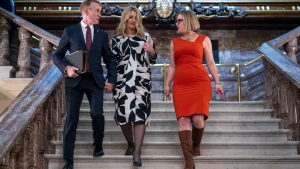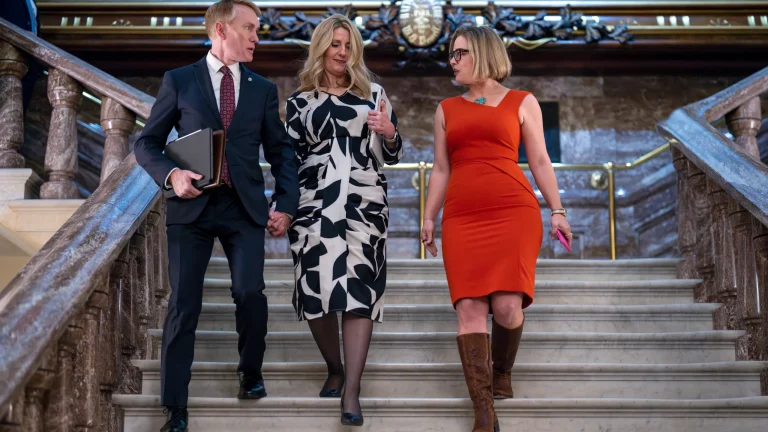NOTE: VIDEO AT THE END OF THE ARTICLE.
A growing rift among prominent progressive Democrats is playing out publicly as Senator John Fetterman (D-PA) and Representative Alexandria Ocasio-Cortez (D-NY) continue to clash on social media over the ongoing Israel-Hamas war. Their sharp and personal exchange highlights deepening divides within the Democratic Party on foreign policy, particularly regarding U.S. support for Israel.
The spat was reignited after AOC criticized the Biden administration’s handling of the war in Gaza, labeling Israel’s military campaign as “unrestrained” and calling it a “genocide of Palestinians.” In a tweet that quickly went viral, she demanded an arms embargo, writing, “The US must stop enabling it. Arms embargo now.”
Senator Fetterman responded by posting a screenshot of a Hill article summarizing her comments, writing, “The tragedy in Gaza is 100% on Hamas. Stop using civilians and hospitals as shields, surrender, and release all remaining hostages—and this ends.”
Ocasio-Cortez fired back with a scathing rebuttal: “I dunno man. I care about little kids dying. I care about human rights. I care that billions of US tax dollars’ worth of weapons are carrying out unspeakable atrocities… Hope this bleak dunk attempt gets you whatever it is you’re going for.”
She followed up with a retweet of MSNBC’s Chris Hayes honoring Shaban Al Dalu, a young Palestinian who died following an Israeli airstrike, writing, “That young man should have been celebrating his 20th birthday today. Instead, the world bore witness to his brutal death…”
The exchange reflects not only a personal rift but a broader generational and ideological conflict within the Democratic Party over America’s role in the Middle East. While AOC and her progressive allies have called for a reevaluation of U.S. military aid to Israel, Fetterman has remained unapologetically pro-Israel since the October 7 attacks.
In what appeared to be a direct swipe at AOC’s position, Fetterman praised Israel’s military operation that reportedly resulted in the killing of Hamas leader Yahya Sinwar. “The eradication of the architect behind the 10/7 massacre epitomizes justice served,” he posted. “My support and my voice for Israel will remain steadfast.”
AOC then retweeted political commentator Mehdi Hasan, who praised Vice President Kamala Harris for her recent remarks acknowledging Palestinian suffering while criticizing ongoing U.S. bombings. AOC added her own push for action: “Rhetoric alone is insufficient. Action is required… Not incessant bombings.”
The continued back-and-forth underscores the growing unease within Democratic ranks as the 2024 conflict continues into 2025. As the presidential election approaches, internal divisions over Israel could become a key issue shaping the party’s unity—and its appeal to younger, progressive voters.
PLAY:

Sarah Mitchell is a bestselling novelist recognized for her insightful and emotionally resonant stories that explore the complexities of human relationships. Originally from Denver, Colorado, Sarah grew up in a family of teachers who nurtured her curiosity and love for storytelling. She studied psychology at Stanford University, where she became fascinated by the intricacies of human behavior—an interest that would later shape her writing career. Sarah’s novels are praised for their nuanced characters, intricate plots, and ability to capture the subtle tensions that define love, friendship, and family ties. Her breakthrough novel, The Spaces Between Us, became an instant bestseller, lauded for its honest portrayal of strained family relationships and the fragile bonds that hold people together. Since then, she has published several works that continue to captivate audiences around the world. Outside of her writing career, Sarah is passionate about mental health advocacy and often partners with organizations to promote awareness and support for those struggling with emotional well-being. Her personal life is quieter—she enjoys hiking in the Colorado mountains, practicing yoga, and spending time with close friends. With each new book, Sarah Mitchell cements her reputation as a writer who illuminates the beauty and struggles of human connection.









